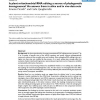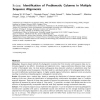51 search results - page 5 / 11 » Automatic genome-wide reconstruction of phylogenetic gene tr... |
IPPS
2009
IEEE
14 years 1 months ago
2009
IEEE
Driven by novel biological wet lab techniques such as pyrosequencing there has been an unprecedented molecular data explosion over the last 2-3 years. The growth of biological seq...
BMCBI
2008
13 years 7 months ago
2008
Background: In plant mitochondria, the post-transcriptional RNA editing process converts C to U at a number of specific sites of the mRNA sequence and usually restores phylogeneti...
CSB
2003
IEEE
14 years 9 days ago
2003
IEEE
A new and essentially simple method to reconstruct prokaryotic phylogenetic trees from their complete genome data without using sequence alignment is proposed. It is based on the ...
JCB
2006
13 years 7 months ago
2006
We describe a novel method for efficient reconstruction of phylogenetic trees, based on sequences of whole genomes or proteomes, whose lengths may greatly vary. The core of our me...
ALMOB
2008
13 years 7 months ago
2008
Motivation: Sequence-based methods for phylogenetic reconstruction from (nucleic acid) sequence data are notoriously plagued by two effects: homoplasies and alignment errors. Larg...


